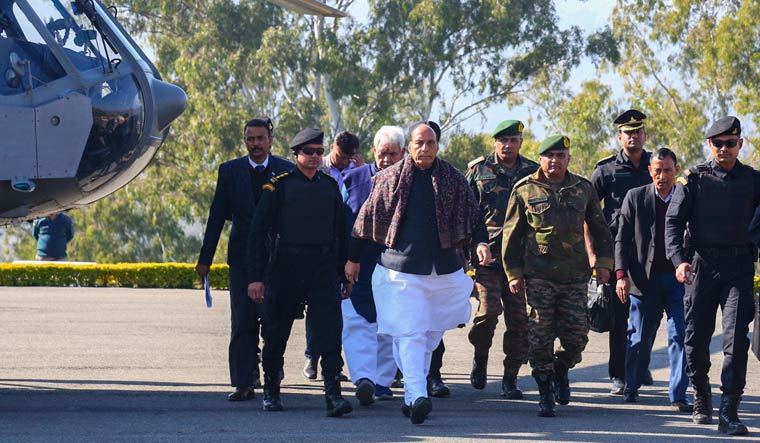Cornelius Ryan’s 1974 popular book ‘A Bridge Too Far’—adapted into a successful war movie in 1979—was about the failure of Operation Market Garden—a failed bid by the Allied Forces during the Second World War to smash through German defence positions in Holland.
So popular did the book and the movie become that the phrase ‘a bridge too far’ began to be used as an idiom to mean overreach. It may well be applicable in the context of the national effort to bring peace in the Union territory which may be easier said than done. Particularly after a chain of events that led to the deaths of three civilians in the terror-troubled havens of Jammu and Kashmir.
It was about 3:45 PM on December 21. An Army Gypsy and a truck carrying troops were rushing to assist a counter-terror operation in Thanamandi tehsil’s Dera Ki Gali in Poonch that had begun the night before. Near a blind curve amid the mountainous and heavily forested terrain, well-trained militants, armed to the teeth, lay in wait. In the ambush that followed, four soldiers fell while two others sustained injuries.
A Jaish-e-Mohammed proxy, People’s Anti-Fascist Front (PAFF), was prompt in claiming responsibility for the attack. The outfit tried to validate the claim by posting pictures of the attack on social media.
But the next day, amid an intensive counter-terror operation to nab the attackers, three local civilians—all from the nearby villages—were found dead under mysterious circumstances, with locals accusing the Army of custodial murder. They were from a group of about six civilians who were picked up for interrogation. It has now led to widespread civilian protests across the region.
Several trends are very worrying.
First, the resentment among the locals—mostly Bakarwals, a shepherding tribal community—is palpable now as the deceased civilians hailed from the community. Usually seen as a bulwark against the support for Pakistan-aided separatist militancy in Kashmir, the seething resentment among Bakarwals would have severe adverse effects on the Indian security structure in this difficult area.
Seen as the Indian Army’s “eyes and ears” in the border stretches along certain stretches of the Line of Control (LoC) with Pakistan, it was a few Bakarwal shepherds who famously reported the presence of Pakistani intruders in Kargil leading to an all-out military conflict in the summer of 1999.
Second, in most of the major terror attacks in Jammu and Kashmir in recent years, the attackers have not been nabbed or eliminated. It raises questions like whether the attackers have slipped back into Pakistan or have simply disappeared among the local residents. In either case, the present security grid needs a definite relook.
In the past year, in the hinterland, 34 terrorists have been killed while four were arrested. On the LoC, 18 infiltration bids were thwarted in which 36 terrorists were killed.
Third and most importantly, it has negated the Indian Army’s ongoing efforts to win the ‘hearts and minds’ of the populace through goodwill missions and initiatives that would have weaned youths from the way of the gun.
A senior serving official from the Indian Army told THE WEEK: “The civilian deaths should not have happened in the first place. They are immensely regrettable. The entire act of making videos of civilians being subjected to torture is very deplorable and tragic to say the least.”
“All those years of the Indian Army’s good and praiseworthy work among the civilians has been eroded and taken us back by years. It will take a renewed effort to rebuild that goodwill again.”
In a damage control mode, the Poonch-headquartered Brigadier Padam Acharya, who headed the 13 Sector Rashtriya Rifles, has been ‘attached’—a term which, in Army parlance, means the official has been shifted elsewhere till the ongoing probe into the civilian deaths is completed.
“Investigations into the deaths are on. While the brigadier has been ‘attached’, depending on the probe, some more heads may roll,” a second source told THE WEEK.
The very fact that there was no denial from the Army’s side while announcing compensation for each of the deceased civilians, including compassionate appointments to the next of kin, may provide some balm to the strain the Army-civilian relationship has come under.
On Monday, Army Chief General Manoj Pande rushed to Poonch where he exhorted his commanders to conduct operations in the “most professional manner” while committing “zero tolerance” for acts of human rights violation.
On Wednesday, Gen Pande again accompanied Defence Minister Rajnath Singh to Jammu to take stock of the situation. A grim-faced Singh said in Jammu, “We have to win battles, eliminate terrorists, but a bigger objective is to win the hearts of the people. We will win wars, but we need to win hearts too… Ensure such things (the civilian killings) don't happen again.”
Started in 1997, the Indian Army’s public outreach plan is largely organised under Operation Sadhbhavana (goodwill) which attempts to bring the people of Jammu & Kashmir and Ladakh closer by developing faith and trust.
Considerable effort from the Army’s ‘operational learning’ has gone into the effort.
Clearly, the way things stand, ‘Sadhbhavana’ will need more thrust than ever to close the rupture of trust deficit that has suddenly set in.



